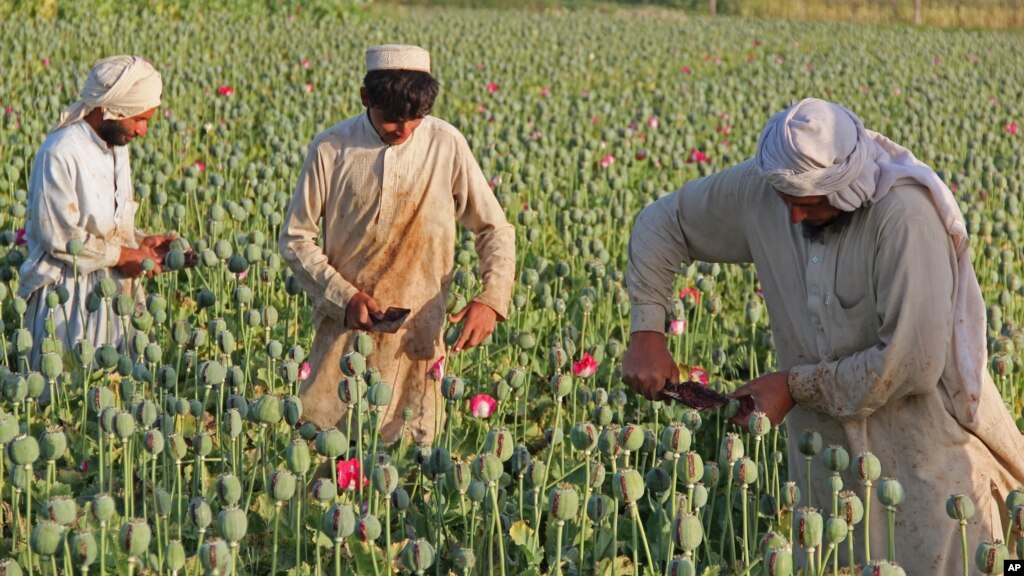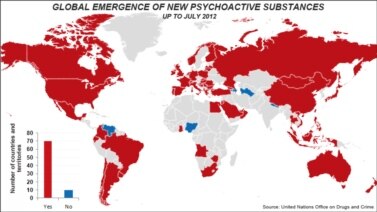
The United Nations says Afghanistan produced a record amount of opium this year. The announcement has raised questions about the internationally-supported efforts to fight drug production in the country.
The UN’s Office on Drugs and Crime says the opium poppy harvest jumped 17 percent from last year. Opium is used to make the drug heroin.
The office said the 2014 harvest could produce as much as 6,400 tons of the drug. The Afghan opium crop, it said, is responsible for 90 percent of the heroin available in the world market.
United Nations officials say the findings show that efforts to stop narcotics production in Afghanistan have failed. Andrey Avetisyan spoke at a press conference in Kabul. He heads the local office of the UN drug agency.
He is calling for better ways to fight drugs both inside Afghanistan and in other countries. And he wants the Afghan government active in those efforts.
“Without tackling the problem of drugs seriously, no serious economic achievement is possible. To develop Afghanistan, to help Afghanistan with economic development, we all together have to finally, seriously do something with the threat of narcotics. We understand with this alarming survey that a new approach to counter narcotics is needed.”
Andrey Avetisyan formerly served as Russia’s ambassador to Afghanistan. He says the Afghan people and their government need to provide the political will and readiness for the anti-drug fight to succeed.
He says the United Nations is pleased to note that the country’s new leadership understands the urgency.
“The new Afghan leadership understands very well that illicit economy, including drugs, is a very serious threat to the plans the new government has concerning economic development of Afghanistan. With this understanding comes a better possibility of common efforts to fight against drugs.”
The U.N. report noted a seven percent increase in the land used to grow poppy plants compared to last year. The report said 89 percent of this area is in nine Afghan provinces with a large Taliban presence. Observers believe Taliban fighters use money from the drug trade to support their campaign against the government.
Din Mohammad Rashedi is Afghanistan’s Minister for Counter Narcotics. He blames the rise in poppy production on the long presidential election campaign this year.
He says there was not a single police officer available to his ministry to destroy poppy fields as part of the government’s fight against the drug trade. Instead, he says almost all the security forces were ordered to protect the election process.
The minister adds that security concerns during the voting also led the government to suspend the drug-fighting efforts. But he defends the decisions, saying the presidential election was historic and the biggest concern for the country.
The United States is reported to have spent nearly $8 billion on counter-narcotics efforts in Afghanistan over the past 10 years. The money was used to launch programs urging Afghan farmers to grow wheat and fruit instead of poppies.
But observers say the large amount of money earned from poppy crops and other payments are far greater than the financial aid from official programs. Some farmers receive payments from the Taliban and criminal groups, some linked to influential Afghans. There are concerns poppy production may increase even more in Afghanistan after international forces withdraw from the country.
I’m Christopher Cruise.
Correspondent Ayaz Gul reported this story from Islamabad. George Grow wrote this story for VOA Learning English. Mario Ritter was the editor. Christopher Cruise read and produced the report.
Words In The News
record - adj. best or most notable among similar things
drug - n. anything used as a medicine or in making medicine; a chemical substance used to ease pain or to affect the mind
harvest - n. the crop after it is gathered; v.to gather crops
crop - n. plants grown by farmers
Now, it’s your turn to use these Words In The News. In the comments section, write a sentence using one of these words and we will provide feedback on your use of vocabulary and grammar.

